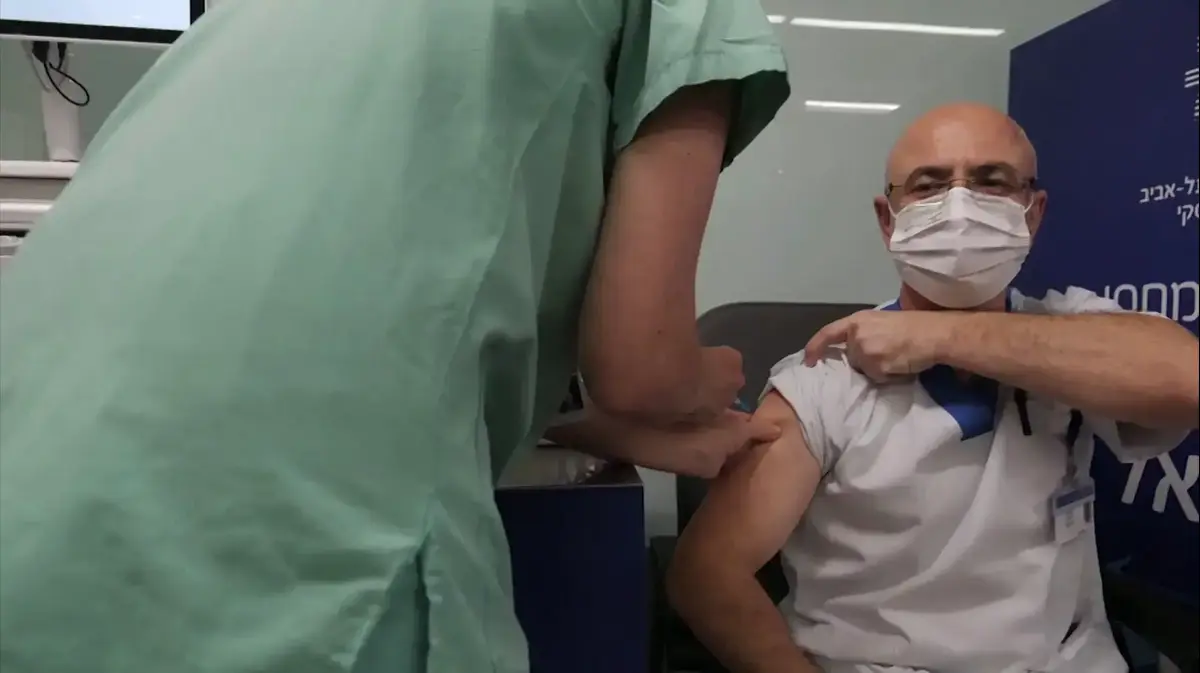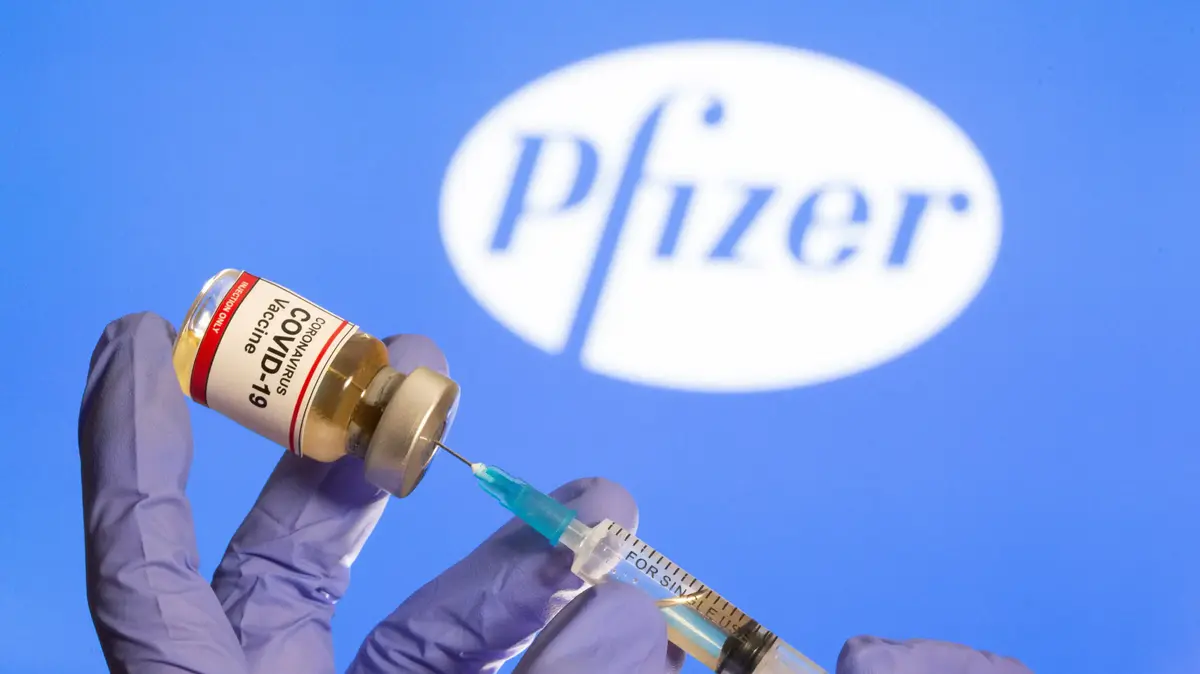Icon: enlarge
Obstacle course to the vaccination target: scene from the vaccination center in the Hamburg exhibition halls
Photo: Christian Charisius / dpa
"Corona laboratory study: Biontech vaccine less effective against South African mutation" - Headings like this can make you pessimistic in the current corona situation.
What the researchers examined in the study, what conclusions can be drawn from this for vaccination protection against Covid-19 and why optimism is still appropriate: the overview.
What new data are there?
On Wednesday, a research group published a preliminary report in the journal »NEJM« which deals with the effect of the vaccine from Biontech and Pfizer on the coronavirus variant B.1.351.
B.1.351 was first discovered in South Africa.
It was already known from other studies that several vaccines against this virus variant are probably not as effective as against the originally circulating Sars-CoV-2 coronavirus.
The current publication reports how well antibodies from the blood neutralize different virus variants in vaccinated people who have received the Pfizer / Biontech product - i.e. render them harmless.
For the experiments, the research group used virus variants with different mutations in the spike protein.
Most of the Covid-19 vaccines are directed against this protein.
Result of the tests: The antibodies were still able to neutralize the virus variant, which contained all the spike mutations of variant B.1.351 - but they were significantly less effective than against the original variant.
The effectiveness was around two thirds lower.
A research group also reported something similar in the »NEJM« with regard to the vaccine from Moderna, such as that from Pfizer / Biontech an mRNA vaccine.
Again, the antibodies of vaccinated persons are less effective in switching off the mutated virus B.1.351.
What can be deduced from this and what cannot?
In both specialist reports it is stated: What exactly this means for the immune response of vaccinated persons is unclear.
It is only about laboratory tests with viruses and blood serums vaccinated.
The experiments cannot precisely predict how the immune response will change in the human body; they can only indicate a trend: namely that the antibody response is less effective.
A relevant point that these experiments do not address are the so-called T cells.
The immune response to pathogens like Sars-CoV-2 is not only based on antibodies.
Another important building block are T cells, some of which are specialized in eliminating virus-infected body cells.
Vaccinations work by simulating an infection in the body.
Not only do they boost antibody production, they also promote the corresponding T cells.
"The T-cell response is directed against other target structures, so-called epitopes, which are located in other areas of the spike protein," says vaccine researcher and infectiologist Leif Erik Sander from the Berlin Charité.
This means that changes in the protein that reduce the antibody response need not have any effect on the work of the T cells.
While antibodies are especially important in the early stages of an infection, T cells may play a role a little later.
»Serious Covid-19 diseases develop in the second to third week of infection.
And this is where the T-cell response is definitely relevant, ”says Sander.
He therefore suspects that the vaccinations can continue to protect against serious disease progression, even if someone has been infected with B.1.351.
However, the experiments confirmed that B.1.351 managed to evade the immune system better.
Sander: "If the antibody response is reduced, mild breakthrough infections will likely increase in people who have been vaccinated and people who have already had a coronavirus infection."
How do the other vaccines against B.1.351 work?
South Africa's decision
not to use
Astrazeneca's
vaccine for the time being caused a stir
.
The reason for this was a study with around 2000 participants in the country in which B.1.351 is now responsible for a large proportion of coronavirus infections.
The investigation found that the vaccination did not reduce the risk of developing mild to moderate Covid-19 disease.
However, the study could not answer the relevant question of whether the vaccination protects against severe disease - and thus also against death from Covid-19.
Because among the comparatively young participants, there was not a single severe course of Covid-19 during the study.
Why?
In the study, there was not a single serious Covid disease, neither among the vaccinated nor in the placebo group.
This was mainly due to the fact that the relatively small study only had comparatively young, healthy participants.
Its structure was therefore not at all suitable to clarify whether the vaccination protects against a severe course of Covid-19.
The study is currently only available as a pre-publication; it has not yet been reviewed by other researchers.
Johnson & Johnson
reported in late January on the results of its Phase 3 studies of a vector vaccine that is said to be sufficient to have a single vaccination.
The effectiveness of the agent to protect against moderate to severe Covid 19 disease differed from region to region.
This is due to the spread of new mutants.
Because while the effectiveness in the USA was 72 percent, it was only 66 percent in Latin America and only 57 percent in South Africa.
Also
Novavax
reported a lower Effektivät its vaccine against Varinate B.1.351 who revealed himself there by a study.
In test persons without HIV infection, the effectiveness of the agent was therefore 60 percent against B.1.351.
The vaccines mentioned work according to different principles, but they all work in principle by causing an immune response against the spike protein of Sars-CoV-2.
The RNA vaccines from Pfizer / Biontech and Moderna inject an RNA blueprint for the spike protein into the body.
Astrazeneca and Johnson & Johnson's vector vaccines bring it in using a harmless virus called the vector.
Novavax contains nanoparticles that transport the spike protein.
So, since B.1.351 contains several mutations that affect the spike protein and affect the body's immune response, it is not entirely surprising if it affects all of these vaccines.
What's next?
The coronavirus mutates relatively slowly compared to other viruses.
However, due to its widespread use, it has already developed some worrying variants that appear to affect vaccines as well.
Researchers and manufacturers have this in mind.
»In the future, for example, booster vaccinations would be possible to protect people who have already been vaccinated against virus variants.
Likewise, people who have not yet been vaccinated could be given polyvalent vaccines at the same time, i.e. vaccines that are directed against several variants - as with the annual flu vaccination, ”says Sander.
That probably means: the first or second Covid vaccination will not necessarily be the last.
Icon: The mirror















